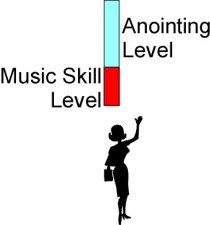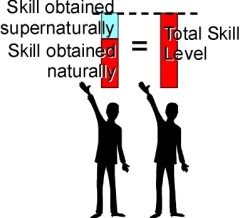Choosing Worship Team Members
by Skill or Anointing
By Shamblin Stone
In choosing Worship Team members, we should not judge people based on their skill level alone, because I have seen many people whose musical skill level rose when they were under the anointing of God. Every Spirit led church should choose their worship team memberes by two aspects. their musical skill level, and the average level of the anointing on them, as pictured to the right.
As I said in the first paragraph, there are two ways of obtaining musical skill. One is by natural means through training, and the other is by supernatural means, by the anointing of God being our teacher. The way God teaches a person musical skill when they are under the anointing is like this. God will play or sing through the person something they naturally are unable to do at that time. Most of the time instrumentalists and singers with some training will recognize right away they are doing something outside their natural ability, and that God is doing it through them. This causes them to pay close attention to what God is doing through them for later analysis. Untrained people will not usually respond this way, because they are not yet aware of their own abilities, and how to recognize when they are exceeding them. They will simply realize they are doing something different which they have never done before.
After this experience, the intrigued musician will then find the time on their own to try to understand what it is God played or sang through them. Most of the time God shows up in this private practice time with his anointing to be the teacher, and to explain what He did. It is because of the musician’s previous music knowledge that they are able to understand so quickly what God was doing in the worship service through them. Usually what happens next is the musician practices what God did through them until that new skill is now added to their repertoire of musical skills that they can do when they choose.
It is usually only the untrained singer or beginning instrumentalist who need the Lord to play or sing something through them more than once or twice before they learn what it is He is wanting to teach them. For these musicians (vocalists and instrumentalists), we Chief Musicians must always be sensitive and pick up on what God is teaching each of them, so we take the time to explain it to them, so they understand it, and are able to reproduce it again later. This helps these people gain a basic music knowledge according to God’s agenda, not ours.
It does not matter if the worship team member is already trained as a musician, or is a beginner on their instrument or voice. I believe this is the way God wants all of His musicians to grow in musical skill. I find it to be the most effective way to raise up a worship team – to do it according to His agenda, not mine. But it is important for us to realize that God wants to teach each worship team member musical skill in such a way that they are able to reproduce that skill at a later date when He wants them to use it. It is not God’s plan to always play or sing that skill through the musician every time He wants it. He wants every musician to grow both in the “grace” (supernatural ability) and the “knowledge” (natural ability) in our worship musical skills. However, once we have learned a skill, it becomes part of our overall musical skill level which we naturally understand no matter how we first obtained it. Skill is skill.
The higher the skill levels in the worship team members, the greater the quality of music will be in that church. The greater the anointing level on a worship team, the greater the manifestation of the presence of God will be experienced in the meetings. Each church has to ask themselves which of these two things is more important. Then each church must decide what is the minimum level of skill and the minimum level of anointing they are willing to tolerate in their worship team members.
In a perfect world, it would be nice to have team members with both of these qualities. However, in reality, it seems that if a person has spent time pursuing musical skills, they usually have not spent much time pursuing the presence of G\od. Likewise, a person who has invested most of their time seeking the presence of God usually has not spent the time necessary to hone their musical skills very much.
Personally, I prefer team members who know and pursue the presence of God over skilled musicians who know nothing of the presence of God. Unskilled musicians who seek God will be trained by God, and will eventually become skilled musicians. Unanointed, skilled musicians seldom learn to seek the presence of God when they are placed on a worship team before a hunger for God’s presence is birthed in them. Pride usually keeps them from being teachable.
It does require tolerance by the church while you are waiting for the anointed people to become skilled, but that is easier than wainting on skilled beople to become anointed. Some churches set the “bar” fairly high so that only the moderately skilled or highly skilled musicians meet the standard to be a worship team member. I, on the other hand, set the “bar” low. All I expect from a worship team member are these basic entry level requirements:
|
Musical Skill Level Requirements |
Anointing Requirements |
|
Instrumentalists must understand the beginner level skills of their instrument(s). |
All participants must be Saved or born again. |
|
Vocalists must be able to match pitches. (If they can’t, I help them privately to meet this requirement, which takes an average of six months.) |
All participants must have a desire to grow in God, and to seek God for that growth. No current growth is necessary. |
This entry level bar never changes on my worship team. However, as the skill levels increase on the team, it helps those who are lower in either the skill or anointing level to develop quicker. Yet, at no time is anyone disqualified from being visible on the worship team because of their lack of development in either of these areas. For the congregation, it is the visibility of those not yet developed worship team members which encourages them to express their worship to the Lord, no matter what their level of musical skill or anointing. For the worship team members it is the motive they receive from participating visibly in the corporate worship services which I count on to drive them to reach more of their potential in both these areas.
Now there’s a word we have not used before, “potential.” At one time I thought every Christian leader could see the potential in people the way I do, but I have found out over the course of my life that it seems to be a special function of the spiritual gift of “a word of knowledge” that God has chosen to operate in me. I’m sure many others have this ability to see potential in others, but so far I have not come across any who do. In fact, God has given me such an acute sense of the musical and spiritual potential of people that it is sometimes difficult for me to see them as they are at the moment. Their potential, many times, is clearer to me than their present status, since where they are right now seems to always be changing, and their potential seldom changes. I see spiritual potential in others by a word of knowledge and my ministry knowledge and experience. And I see musical potential in people by a word of knowledge and my music training or background.
When I look at someone God has brought to me to Pastor as part of the worship ministry of the church in which He has placed me, here’s how I see them. I separate their present music skill level from their present average anointing level, and analyze where each of these levels are currently. Then, without even asking God to do this, I am able to look into their future and see their potential music skill level and anointing level. The very next thing I ask God is always, “How do you want me to help them to reach these potentials?” He has always given me a plan for every person he has brought to me.
From then on I look at that person according to the vision God gives me of their potential. I call those things that are not as though they are. I treat that person as though they have already reached their potential, and I do not let them settle for anything less than what God showed me about them. My relationship with them is forever geared to equipping them in every way for their potential, and giving them every opportunity to realize their potential in Christ. I do not judge them by their mistakes, but by their potential. I do not require that they stop making mistakes, but only that they learn form them. It is only when a person violates the minimum requirements as listed above to stop desiring to grow in God that they are eliminated from their current ministry, and that only happens after a grace period where several attempts are made by me to bring them back into their first love for Christ.
Every person in the church makes mistakes of all kinds. My visible extended period of mercy, and the use of the unskilled, demonstrates to the entire church how God does not discard us quickly at the first sign of a mistake. My using of those who are not strong either musically or spiritually demonstrates how in our weakness God can be strong in us. It demonstrates that anointing is not talent or skill, and that the most un-skilled person can know and experience the awesome, wonderful, majestic, powerful presence of God. Because God doesn’t inhabit the beautiful song, He inhabits the praise, the worship of His people, no matter how skilled or unskilled they are, …no matter how strong or broken they are, …no matter how healed or sickly they are. God inhabits praise.
If you place skill as a higher priority than anointing for your worship team, it’s because performance is more important than the presence of God to you. Your ministry philosophy is more about building your church, than about building the people of your church. Most of the time, churches who are performance driven are motivated by a desire to please men, not God. Every decision they make is to try to please man, not God. They want the church to look good so it will impress the visitors. Likewise, they want the music to be great to impress those who have come. They want the preaching to improve so people feel they are being fed.
This is the world’s mentality, it is not Biblical thinking! The world says, “What about me?” But the Bible says, “What about God?”
When will we desire that our preaching is better so it more accurately represents God’s heart, and His word for His people? When will we start desiring that God is ministered to by our worship music so His presence is obtainable for everyone in our meetings? When will we start desiring that Jesus be lifted up, not a facility, not a program, not our outreaches, not how much we are doing, and how much others are impressed by that, but that Jesus is lifted up by everyone so that HE can draw all men unto Himself? Why not start now?







